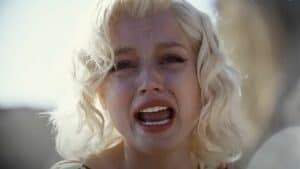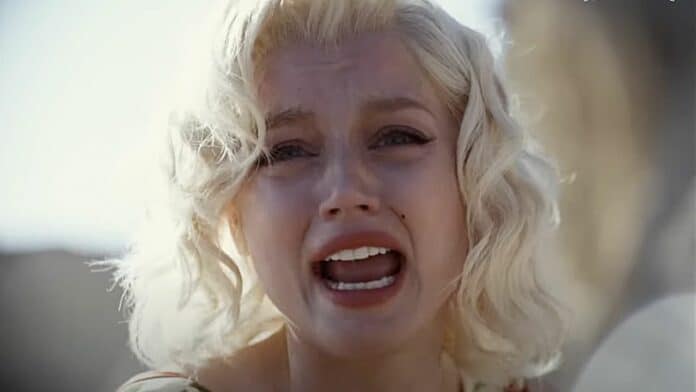Blonde is a fictionalised retelling of the life of Marilyn Monroe and goes over her childhood to her life as a Hollywood icon. The movie is now streaming on Netflix.
Story
Blonde follows a fictionalised version of Marilyn Monroe, or Norma Jeane, through her childhood and charts the events that led her to become a Hollywood icon.
The film goes over her entry into the industry and skims over her body of work. It goes deep into her relationships, and the overarching themes of parenthood- both of hers growing up, as well as her hope of bearing children.
The film also goes over the extreme sexualisation Marilyn had to face in the industry, and the eventual toll this took on her.
The storyline, however, does not quite cover any of her achievements and provides her with little to no autonomy of her own. She is merely a pawn in the larger landscape occupied by men in an industry that just praised her for her looks.
There is no real exploration of her character aside from a brief look into her relationships, and her trauma is brought down to a reductionist idea of not having a solid father figure in her life.
Performances
Ana de Armas puts forth an intriguing performance as Marilyn and is one of the main reasons to watch the film. The way she embodies her character is truly remarkable, and she brings forth a solid act as a Hollywood icon.
While other characters were visible only for short periods of time, a few other noteworthy performances were brought forth by Julianne Nicholson as Norma’s mother and Adrien Brody as Arthur Miller. The two brought life into their characters and made for an interesting watch whenever they appeared on the screen.
Positives
The experimentation with film stock and aspect ratios is interesting to watch, and the film uses novel camera angles as well, taking on a quite experimental flair in terms of cinematography. The background score also adds immensely to the viewing experience as a whole.
Ana de Armas’ performance is one of the key saving graces of the film, and it is almost as if it is actually Marilyn on screen- with a striking resemblance and her exact mannerisms.
Negatives
The structure and content of the film are quite noticeably borne out of the male gaze, with each scene coming across as a voyeuristic look into Marilyn’s character, instead of actual exploration of the abuse and violence she faced.
Abortion and Marilyn’s struggles with parenthood are recurring themes, but the way abortions are dealt with in the film, especially in the current socio-political scenario, leaves much to be desired. There is a scene where an unborn foetus talks to her, which steers the narrative dangerously close to an anti-choice perspective.
The lack of agency is also depicted in the overly sexualised view of the female body. In trying to depict the sheer amount of objectification Marilyn faced in the industry, Blonde follows the same path and just uses her character as a prop in a messy narrative.
The fictionalisation of the life of a real person, and creating a storyline that makes it hard to differentiate fact from fiction is a problem on its own but coupled with the voyeuristic gaze in the film makes it unbearable to watch. Marilyn is not provided with any depth or agency that she surely possessed, and even her acting talents are brushed aside.
None of her achievements are truly highlighted, and her entire persona is brought down to being a sex symbol to gaze upon. In trying to be deliberately provocative, the film takes away from the real essence of the message it wanted to bring across.
Verdict
In trying to comment on the sexualisation Marilyn faced, Blonde, unfortunately, goes down the same path and fails to bring the point across.
Instead, it stands as an almost 3-hour-long film that gets unbearable to watch with its sordid depictions of Marilyn, with no actual depth or exploration of her character to back it up, sticking only to a surface-level narrative with no agency awarded to her.
Blonde

Director: Andrew Dominik
Date Created: 2022-09-28 12:30
2
Also Read: Blonde (2022) ending explained: Does Marilyn ever find her father?

